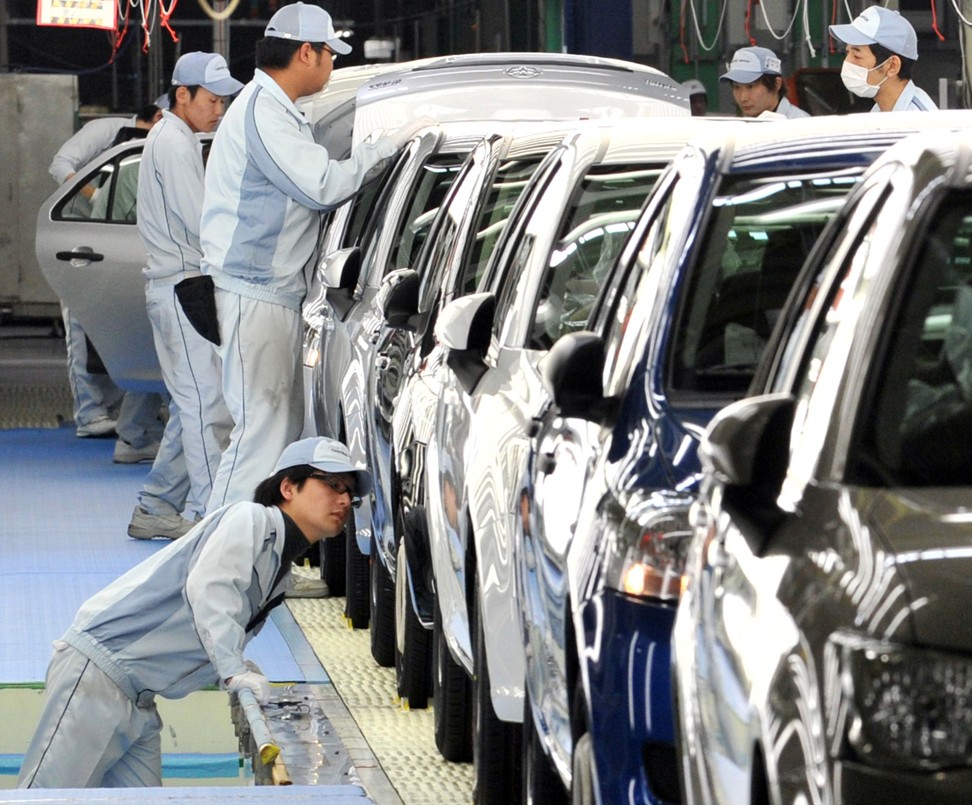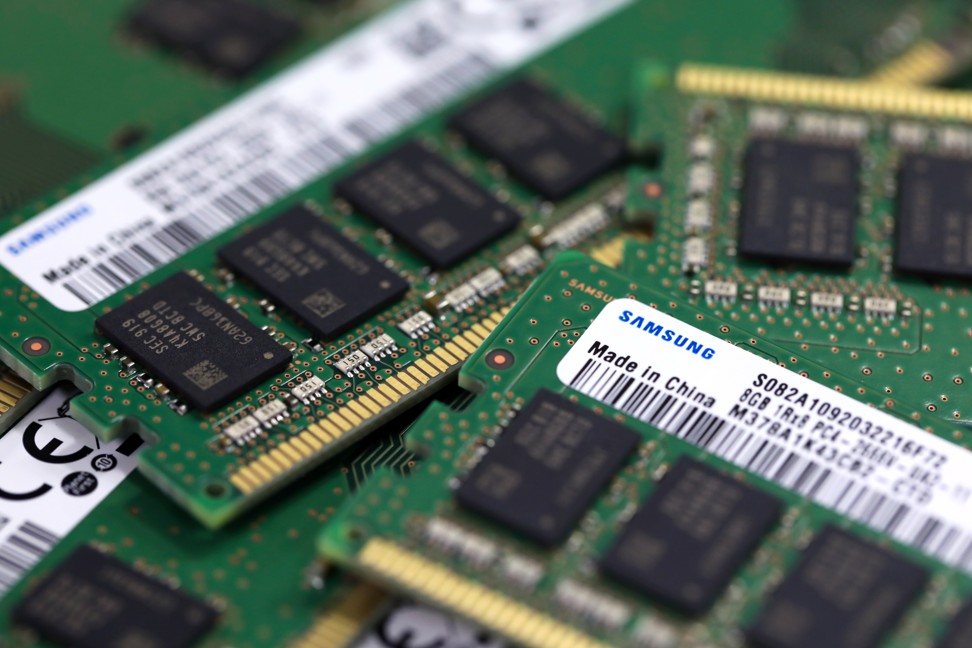
Japanese firms fear escalation in South Korean trade spat as beer, car and fashion brands take a hit
- The likes of Toyota, Asahi Breweries, Uniqlo, and Muji are all keeping a close eye on tensions between the East Asian neighbours
- Analysts say both sides have adopted Donald Trump's approach, which has in effect, legitimised the weaponisation of trade

Fearing further backlash from Korean consumers, Japanese companies are tiptoeing around the tit-for-tat dispute between their conservative government and South Korea over Japan’s wartime past as the US-China trade war hits global growth.
Sales of Japanese beer, cars and clothing in South Korea have declined since the dispute erupted in early July, due in part to a consumer boycott of Japanese products unleashed by the trade dispute, but also against the backdrop of wobbly growth patterns in South Korea’s export-reliant economy because of sluggish global demand for semiconductors.
Toyota sold 1,847 cars in South Korea in July, down 8.2 per cent from a year earlier and 31.2 per cent from June, even as its global sales rose 3.6 per cent. In the first six months of 2019, Toyota’s global sales improved 23 per cent to 4.79 million, but its sales in South Korea remained flat at 15,000, accounting for just 0.3 per cent of the global total.
“We cannot confirm that the boycott was the main cause of sluggish sales in South Korea,” Toyota spokeswoman Keiko Sato said. “In the bigger picture, South Korea’s new vehicle sales dropped 5 per cent on the year at a time of a global economic slowdown.”

Sato added that “we hope so and we believe” that Korean consumers are still attracted to brands such as Toyota and Lexus despite the strained diplomatic ties, while also pointing out that the Toyota Camry won the 2013 South Korean car of the year award.
Japanese companies are cautious about discussing how the boycott is affecting their sales for fear of triggering a sharp reaction from Korean consumers. Last month, Fast Retailing, Japan’s largest clothing maker, which owns the popular Uniqlo brand, issued an apology for remarks by chief financial officer Takeshi Okazaki that the impact of a boycott of Japanese goods would not last long. Of over 2,100 Uniqlo stores worldwide, 186 are in South Korea.
Asahi Breweries acknowledged that the anti-Japanese sentiment has had “some impact” on its beer sales in South Korea, but its spokesman only said that the company was “collecting information” and that it would “respond carefully.”
Ryohin Keikaku, which sells the Muji clothing, furniture and other consumer goods, has over 950 stores worldwide, with 34 in South Korea.
It is true that there is a certain impact on customer traffic at our Korean stores in the last several weeks, but we refrain from disclosing specific figures
“It is true that there is a certain impact on customer traffic at our Korean stores in the last several weeks, but we refrain from disclosing specific figures,” spokeswoman Yucong Liu said.
Last month, Tokyo tightened guidelines on exports to South Korea of three materials crucial to making chips and display panels, an apparent protest against a decision last year requiring Japanese firms to compensate South Koreans forced into labour during Japan’s 1910-45 occupation of the Korean peninsula. Japan believes the issue of compensation was settled under a 1965 treaty.
Tokyo claimed the restrictions are due to lax controls in South Korea on the export of sensitive goods including hydrogen fluoride, a key substance in chip-making, that can also be used as a chemical weapon. South Korea denied the claim.
On Monday, South Korea said that it will remove Japan from its “whitelist” of trusted trade partners that enjoy preferential trade treatment next month. Japan had already announced at the start of August that it would remove South Korea from its list on August 28.
However, many analysts have compared the escalating protectionism on Japan’s part with that of the Trump administration in the United States.
In the three years since US President Donald Trump entered the White House, he has unleashed a series of tariffs and duties on goods from economic rivals China, but also allies including Japan and South Korea, as well as the European Union, Canada and Mexico.
Both sides in the Japan-Korea stand-off are said to have been emboldened by Trump's approach, which has in effect, legitimised the weaponisation of trade.
“It’s not as if South Korean chip makers were facing an immediate cut-off of material supplies or Japanese companies were seeing a supply shortage of semiconductors,” said Mitsubishi UFJ Research and Consulting economist Shinichiro Kobayashi.
“On the trade front, Japanese and South Korean firms are keeping their cool, staying away from the bilateral political agenda.”
On Thursday, Japan approved the first shipment of a chip-making chemical to South Korea under the new guidelines.
Japanese economists point out that Tokyo’s stricter trade controls, which require more red-tape for exports to South Korea, are not as harsh as an export ban, and that Japanese companies do not face an immediate threat of a supply chain breakdown in the technology industry at a time when smartphone markets are saturated globally and semiconductor demand is dropping.
On the trade front, Japanese and South Korean firms are keeping their cool, staying away from the bilateral political agenda
“Historical revisionism among Japanese leaders is deep-rooted and I knew Japan’s refusal to sincerely apologise for its wartime actions would trigger a harsh Korean reaction like a consumer boycott of Japanese products,” said a second-generation Korean living in Japan who referred to herself only Kim due to personal security concerns. “The elite in this country looks down on Chinese and Koreans as the subjects of Japan’s former colonies.”
The risk to supply chain networks would grow if Samsung Electronics, the world’s largest semiconductor supplier, ran out of key materials for making chips. It relies on Japanese companies for 80 to 90 per cent of its needs and the quality of Chinese and Russian-made alternatives is not high enough, said a Japanese industry source who declined to be named.
But he added that even if Samsung were forced to cut dynamic random-access memory supplies, American and Taiwanese manufacturers could make up for any supply shortages.
Mitsubishi’s Kobayashi said the downside risk to Asian economic growth posed by supply chain concerns and the Korean boycott of Japanese products is not as serious compared to a shock caused by a natural disaster and the more widespread Chinese boycott several years ago.

The massive flooding in Thailand in 2011 wreaked havoc on the supply chain networks of Japanese carmakers and electronics firms just as they were recovering from the drag following the earthquake and Fukushima nuclear power plant meltdown in March 2011.
In 2012, a bilateral territorial dispute over small islands in the East China Sea prompted Chinese consumers to boycott Japanese products, hitting exports immediately. At the time, Toyota and other Japanese car makers saw their sales in China plunge for several months from September.
Last month, South Korea’s exports slumped 11.0 per cent from a year earlier, the eighth straight month of declines, hit by soft demand for semiconductors, slowing global growth amid the US-China trade war and Japan’s restrictions on exports to its neighbour.
The Bank of Korea unexpectedly cut its policy rate and slashed its economic growth and inflation forecasts in July, joining emerging market central banks in easing in the face of growing downside risks. This month, the Reserve Bank of India cut rates for the fourth time this year, while the central banks of New Zealand, Thailand and the Philippines have made similar moves.